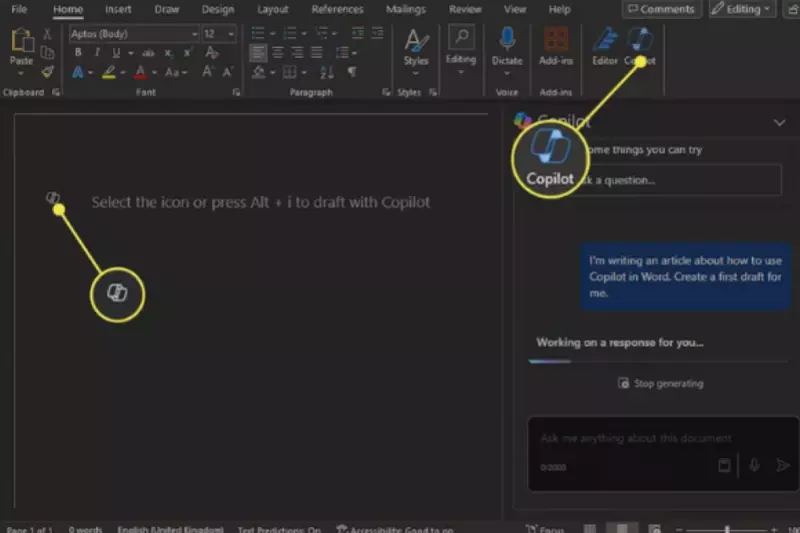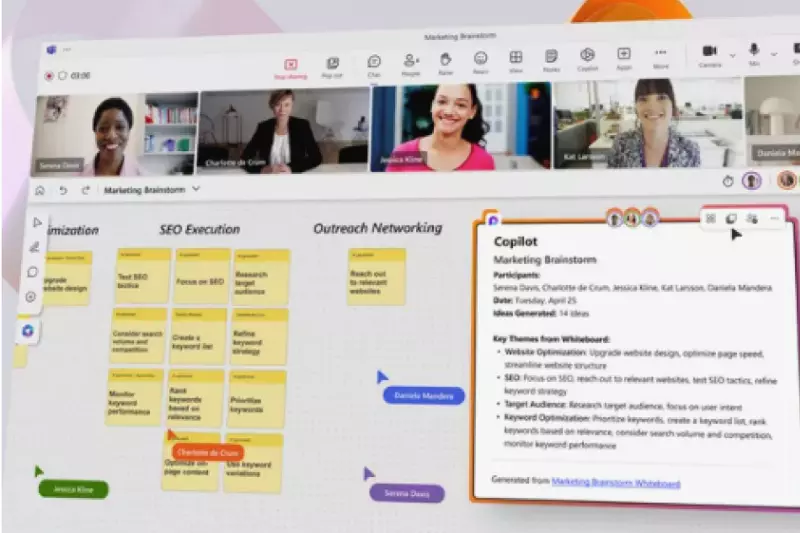If you’ve ever struggled with writing or editing in Microsoft Word, you're not alone. Many users struggle to draft content, edit, and organize their documents efficiently. These tasks can be time-consuming and frustrating, especially for those not confident in their writing skills. This blog post is here to solve that problem by providing a complete guide on using Copilot in Word.
Microsoft’s Copilot, an AI-driven tool, offers support in writing, rewriting, and even chatting about your documents, making it easier than ever to produce high-quality work. Whether a student, professional, or casual user, this guide will help you understand and maximize Copilot's features. You’ll learn how to enable Copilot, use it effectively, and explore how it can enhance your productivity in Word. Let’s dive in.
What Is Copilot For MS Word?
Copilot for MS Word is an AI-powered tool that helps users write and edit documents more efficiently. It offers real-time suggestions for writing, grammar, and formatting. Whether you're working on an essay business report or brainstorming ideas, Copilot can help by generating content, suggesting edits, and improving your writing. This tool does more than just check spelling and grammar. It uses advanced technology to understand the context of your writing and give valuable recommendations. Copilot can rewrite sentences for clarity, suggest synonyms, or summarize long paragraphs, making your work faster and more polished.
How To Use Copilot In Word?
To use Copilot in Word, click the “Copilot” icon in the toolbar. It assists with writing, editing, summarizing, and generating content based on prompts. Copilot can suggest improvements, rewrite text, or format documents to enhance productivity and streamline tasks within Word. The interface is designed to be user-friendly, making it easy for you to navigate and utilize its features. Let’s understand perfectly and learn How to use the Copilot in Word you first need to enable it. Here’s how:
1. Open Microsoft Word: Launch Microsoft Word on your desktop or web browser.
2. To access the Copilot Feature, Go to the "Insert" tab on the toolbar and select "Copilot" from the dropdown menu.
3. Sign In: You may need to use your Microsoft account to access the Copilot feature.
4. Enable the Feature: Click on the toggle switch to enable Copilot.

Pro Tip:Ensure your Microsoft Word is updated to the latest version to avoid compatibility issues.
Once you’ve Enabled Copilot, Follow These Steps To Start Using It Effectively:
1. Open or Create a Document: Open an existing document or start a new one in Word.
2. Activate Copilot: Look for the Copilot icon in the toolbar and click on it.
3. Interact with Copilot: Type or speak your instructions to the AI, like asking it to draft content, rewrite a sentence, or provide formatting tips.
4. Review Suggestions: Copilot will offer suggestions you can accept, modify, or ignore.
5. Quick Note:Copilot works best when given clear and specific instructions.
What Can You Do With Copilot For Word?
With Copilot for Word, you can generate, edit, and summarize content effortlessly. It suggests improvements, rewrites text and helps format documents. This tool enhances productivity by streamlining writing tasks, improving clarity, and offering real-time suggestions to refine your work, making it more efficient and polished. Copilot offers several valuable features to enhance your Word experience. Copilot for Word provides a range of features to improve your writing and editing experience. Here's a step-by-step guide on how to use these capabilities effectively. The versatility of Copilot empowers you to tackle a wide range of writing tasks with confidence.
1. How To Draft Using Copilot In Word:
Step 1:Open your Word document, select the Copilot icon, or press Alt + I to launch the Copilot drafting feature.
Step 2:Type what you want to write or your ideas about the text in the Copilot box that appears.
Step 3:If you want Copilot to use specific styles or reference other documents, click the "Reference a file" button and select the appropriate document.
Step 4:Click "Generate" to allow Copilot to create a draft based on your input.
Step 5:Review the generated content. If satisfied, select "Keep it" to save the draft.
Step 6:To make immediate adjustments, type changes in the text box labeled "For example." and click the arrow button.
Step 7:Manually edit the draft or continue using Copilot to refine it.

2. How To Rewrite With Copilot In Word?
Step 1:Highlight the text you want to rewrite in your Word document.
Step 2:In the Copilot window, click "Rewrite with Copilot."
Step 3:Wait for Copilot to rewrite the selected text.
Step 4:Choose "Keep it" to retain the rewritten text or use the text box to make further changes.
3. How To Summarize Or Ask Questions With Copilot?
Step 1:Click on the Copilot icon in the top-right corner of your screen to open the conversational window.
Step 2:Type your question or request in the chat bar (e.g., “Summarize the document” or “What is the font used on page 3?”).
Step 3:Select one of the pre-made commands in the window.
Step 4:Wait for Copilot to process your request and provide a response in the pop-out window.
Step 5:Continue interacting with Copilot by typing additional questions or refining your commands as needed.
4. Chat With Copilot About Your Word Document
Step 1:Click on the Copilot icon within the Word document you are working on. This will open the chat window, where you can interact directly with Copilot.
Step 2:Begin by typing a specific question or request. For example, ask Copilot to “Define a call to action” or “Summarize this content into short snippets.”
Step 3:If you need your content presented differently, request changes like “Convert this text into bullet points.” This is ideal for making information more accessible to scan.
Step 4:To expand your content, ask Copilot open-ended questions, such as “Can you suggest quotes for my paper?” or “How can I make this document sound more professional?”
Step 5:If the information is not in the document, Copilot will use its language model capabilities to generate an appropriate response or provide suggestions.
Step 6:If you use Copilot to summarize a document, you can ask it to “Include references for each summary section” to identify the source of the information.
Step 7:Click on the sparkle icon to access suggested prompts. Copilot will display a few basic prompts to help you explore your document further or enhance existing content.
Remember:You can continually refine the generated content to suit your style and needs.
How To Use Copilot In Word For Mobile?
Using Copilot in Word on mobile enhances your document creation experience. To access this feature, you must install the app, sign in, and enable Copilot. Here's a simple guide to help you get started with Copilot on your mobile device:
- Install the Word App from your app store.
- Sign in with your Microsoft account.
- Locate and tap the Copilot icon on the toolbar.
- Enable Copilot to start using its features.
- Keep your app updated to access the latest functionality.
Tip:Keep your app updated to access the latest features of Copilot.
How To Use Copilot Pro In The Desktop Version Of Word
Copilot Pro in the desktop version of Word provides powerful tools for advanced document analysis, editing, and productivity. With its intuitive interface, you can streamline your workflow and enhance the quality of your writing. Before diving into the 16 steps, it's essential to understand how to access and enable these features effectively.
1. Open Word on Desktop: Ensure you have the latest version of Microsoft Word installed on your desktop.
2. Access Copilot Pro: Go to the “Tools” menu and select “Copilot Pro.”
3. Sign In: Enter your Microsoft credentials if prompted.
4. Enable the Feature: Toggle on the “Enable Copilot Pro” button.
5. Choose a Document: Open the document you want to work on.
6. Use Advanced Editing Tools: Click “Edit with Copilot Pro” to access advanced editing features.
7. Analyze Your Document: Use “Analyze Document” to get insights on readability, grammar, and style.
8. Content Drafting: Use “Content Drafting” to create or modify new sections.
9. Paragraph Summarization: Highlight a paragraph and select “Summarize” for a concise version.
10. Language Translation: Translate sections of your document into different languages using the “Translate” feature.
11. Enhanced Grammar Check: Access a detailed grammar and punctuation check for each document part.
12. Formatting Suggestions: Click on “Format Suggestions” to optimize the layout and design of your document.
13. Voice Dictation: Use “Voice Dictation” to input text through speech.
14. Real-Time Collaboration: Collaborate with others by sharing your document directly within Copilot.
15. Document Backup: Ensure your document is automatically saved with the “Auto Backup” feature.
16. Exit and Save: Once finished, click “Save” to save your changes and exit Copilot Pro.
How To Use Copilot Pro In The Web Version Of Word?
Copilot Pro, the web version of Word, offers a range of features to boost your online writing and editing experience. It seamlessly integrates into the browser, allowing you to enhance your productivity. Before exploring the steps, knowing how to access and enable these powerful features in the web version is essential.
1. Log in to Microsoft Word Online: Open Word Online and sign in using your preferred web browser.
2. Enable Copilot Pro: Click “Settings” and find the “Copilot Pro” option.
3. Open a Document: Choose a document from your OneDrive or upload a new one.
4. Select Copilot Pro: Click on the “Copilot Pro” icon in the toolbar.
5. Analyze Text: Use the text analysis tool to check grammar and style.
6. Edit and Rewrite: Utilize the “Rewrite” option to modify sentences or paragraphs.
7. Receive Formatting Advice: Get suggestions on improving the formatting and design of your document.
8. Save Changes: Save your document after making all necessary edits.
How To Get Copilot In Word
To start using Copilot in Word, you must ensure it's available on your platform. Enabling Copilot is simple, whether you're using the desktop, mobile, or web version. Here's a brief guide to help you access and activate Copilot in Word for a smoother writing experience.
1. Update Your Microsoft Office: Ensure that your Microsoft Office is updated to the latest version.
2. Access Microsoft Store: Search the Microsoft Store for the latest Office add-ons.
3. Install the Add-on: Select “Copilot for Word” and click “Install.”
4. Sign In with Microsoft Account: Complete the installation with your Microsoft account.
How To Use Copilot In Word Quick Success Tips?
If you want to make the most of Copilot in Word, here are five detailed tips to ensure success. These insights will help you use this AI tool effectively to improve your writing, editing, and overall productivity in Microsoft Word.
1. Provide Clear And Specific Instructions
Clear, detailed instructions are essential when interacting with Copilot. Instead of vague commands like "Help me write," try specifying your needs, such as "Draft a 300-word introduction about digital marketing trends for 2025." The more precise your instructions, the better Copilot will understand and deliver the desired content.
- Why It Works: Copilot interprets your requests using natural language processing. The AI is more effective when given specific commands because this reduces ambiguity and allows the tool to focus on precisely what you need.
- Practical Example: If you're drafting a report, instruct Copilot to "Summarize the key points from the third paragraph and suggest a concluding sentence." This clear directive helps Copilot to provide a targeted response that matches your expectations.
2. Regularly Review And Refine Copilot’s Suggestions
Only accept Copilot's suggestions after reviewing them. While Copilot offers excellent assistance, it's still an AI tool and might only sometimes capture the nuances of your desired tone, style, or context. Review each suggestion, refine it, and adjust it to align it with your voice and objectives.
- Why It Matters: Reviewing ensures the content remains accurate, relevant, and aligned with your style. It also helps you maintain a human touch, making the text more relatable and engaging for readers.
- Pro Tip: Use Copilot's suggestions as a foundation, but always add your unique perspective. This can involve rephrasing sentences, adding more context, or adjusting the tone to suit your audience.
3. Use Copilot Frequently To Master Its Features
The more you use Copilot, the more familiar you'll become with its capabilities and features. Regular use allows you to explore different functionalities like rewriting, summarizing, and formatting, helping you understand how each feature can best serve your needs.
- Benefits of Frequent Use: Regular practice helps you learn shortcuts, discover new commands, and become more efficient with the tool. Over time, you’ll develop an intuitive sense of which features to use in different scenarios, saving you time and effort.
- Strategy for Mastery: Start with simple tasks, like asking Copilot to rewrite a few sentences or suggest synonyms. Gradually move on to more complex tasks, like generating paragraphs or analyzing your document’s readability.
4. Customize Copilot Settings To Suit Your Preferences
Copilot offers customization options to help tailor its suggestions to your needs. For example, you can adjust language preferences, tone, and writing style settings. Configuring these settings can significantly enhance the relevance and usefulness of Copilot's suggestions.
- How to Customize: Go to the settings menu within the Copilot interface and explore options such as setting your preferred tone (formal or informal), selecting your writing style (academic, creative, or technical), and choosing the level of complexity (simple or advanced).
- Example of Customization: If you are drafting a business proposal, choose a formal tone and a concise writing style to ensure clarity and professionalism. You select a more relaxed tone with a descriptive writing style for a creative project.
5. Leverage Copilot’s Help And Learning Resources
Don't hesitate to use the help and learning resources available within Copilot. Microsoft provides tutorials, guides, and FAQs to help you understand how to make the most of the tool. These resources are beneficial if you're new to Copilot or trying to figure out a specific feature.
- Why Use Learning Resources?: Learning resources offer quick solutions and in-depth knowledge about Copilot's capabilities. They can also provide troubleshooting advice if you encounter issues using the tool.
- How to Access Resources: Look for the “Help” or “?” icon within the Copilot toolbar. Here, you can find articles, video tutorials, and community forums where you can ask questions and share experiences with other users.
By implementing these quick success tips, you’ll be able to unlock the full potential of Copilot in Word, enhancing your productivity and improving your document creation process.
Conclusão
Using Copilot in Word can revolutionize creating, editing, and managing your documents. With its AI-driven capabilities, Copilot offers powerful tools to draft content, refine text, and improve productivity, whether you are working on a desktop or mobile version. Remember to provide clear instructions, regularly review suggestions, and customize settings to fit your needs. Remember to explore available help resources to get the most out of this tool. Ready to experience the future of writing VisitCopilot.Liveand explore how Copilot can enhance your Word experience today. Embrace this innovative tool, and watch your efficiency and creativity soar.


















